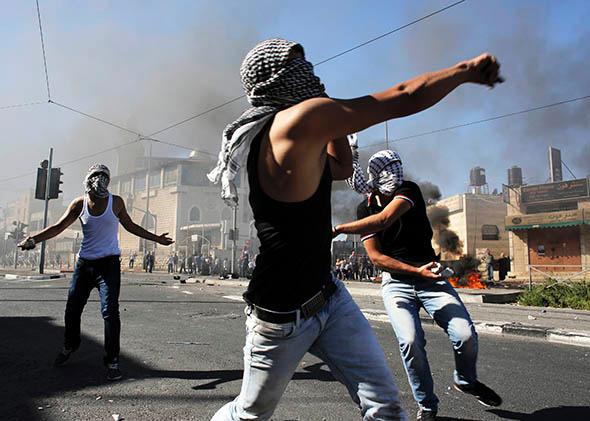Israel is seething. On Monday, searchers found the bodies of three Jewish teenagers who were kidnapped and murdered on June 12. On Tuesday, protesters in Jerusalem chanted “Death to Arabs” and tried to attack Arabs on the street. Thirty-five thousand people endorsed a Facebook page calling for revenge. Then, on Wednesday, another boy was abducted and killed. This time, the victim was Palestinian.
We don’t yet know who killed this boy. But one thing is clear: The mentality at the heart of terrorism—the willingness to punish many people for the sins of a few—has infected Israel.
Jewish teaching, like Muslim and Christian teaching, forbids deliberate or reckless harm to innocent people. But Israel has long faced terrorist threats on all sides. From bitter experience, it has developed a doctrine of tit for tat, hitting back hard to discourage its enemies from striking again. Together, the terrorism and the reciprocity have led to a policy of limited collective punishment.
One example is Israel’s presumption of geographic responsibility. Under rules announced two years ago by its military chief of staff, attacks in various parts of Israel will result in retaliatory strikes on the nearest enemy, regardless of who staged the attack. If Israel is hit in the south, it will strike Hamas in Gaza. If Israel is hit in the north, it will strike Hezbollah in Lebanon.
Another example is Israel’s tradition of demolishing the homes of suspected Palestinian criminals. It doesn’t matter whether the suspect has been convicted, who owns the home, or who else—parents, siblings, children—lives there. The point, according to the spokesman for Israeli Prime Minister Benjamin Netanyahu, is to “disincentivize attacks.” According to Israel’s highest court, the perpetrator “should know that his criminal acts will not only hurt him, but are apt to cause great suffering to his family.”
These policies aren’t morally equivalent to deliberate attacks on civilians. But once your government starts to rationalize the destruction of children’s homes, it’s hard to know where to stop. Increasingly, Israel is struggling to control Jewish settlers whose “Price Tag” attacks target random Arabs with arson and vandalism.
In the weeks leading up to the June 12 kidnappings, Netanyahu used Israel’s collective-responsibility doctrine to scrap peace talks with Palestinian President Mahmoud Abbas. “Israel will not conduct diplomatic negotiations with a Palestinian government backed by Hamas,” said Netanyahu. Never mind that the Palestinian government’s ministers don’t belong to Hamas and don’t communicate with it.
Hamas has a long record of terrorism and has praised the June 12 kidnappings. But unlike other terrorist groups, it has never claimed responsibility for the crime. (On Tuesday, it essentially denied involvement.) Nevertheless, Netanyahu almost immediately blamed Hamas. He offered no evidence until two weeks later, when Israel named two suspects and said that one had been recruited by Hamas. As Max Fisher points out, the suspects actually belong to a clan that habitually flouts Hamas. Netanyahu also declared Hamas responsible for a recent increase in West Bank terrorism, contradicting an intelligence briefing that traced the increase to “private Palestinian citizens” and jihadist cells independent of Hamas.
Blaming Abbas for the kidnappings is an even bigger stretch. He has denounced the crime and has helped Israel search for the culprits. But under Israel’s collective-responsibility theory, he, too, is culpable. “If the abduction comes from P.A. territory, it [the Palestinian Authority] is responsible,” said one of Netanyahu’s ministers. “If it was executed by Hamas, which is represented in the P.A. government, the P.A. is responsible.” Another minister pledged that Israel would “extract a heavy price from the Palestinian leadership.”
These declarations are more than rhetoric. Since June 12, Israel has used them to justify a sweeping assault on Hamas and anyone associated with it, in Gaza as well as the West Bank. Israel’s military spokesman says the campaign’s mission is “to strike a substantial blow on Hamas—its infrastructure, its institutions and everything that keeps it going.”
Israeli forces road-blocked Hebron for a week. They raided or searched hundreds, perhaps thousands, of homes. They arrested more than 400 people, including professors, imams, legislators, and former government ministers. They trashed the office of a nonviolent organization that facilitated Hamas’ endorsement of Abbas. They barred Palestinians from visiting family members in jails. They demolished the homes of the kidnapping suspects—who hadn’t been found, much less tried—even though their relatives still lived there. They launched airstrikes on Gaza, declaring Hamas responsible for whoever had fired rockets from the strip. “Either Hamas stops it, as it is responsible for the territory, or we will stop it,” said Netanyahu.
Hundreds of Israelis assembled in Jerusalem to demand Arab blood. Military and police officers posed with weapons on Facebook pages advocating revenge. “Blood for blood,” said one image. “Death to Arabs,” said another. Others called for strikes in Gaza or the Golan, far from the kidnapping site.
Then came the murder of the Palestinian boy. As of July 3, we don’t know who did it. But Israel’s reaction is nothing like its response to the June 12 abductions. Instead of rushing to blame parties and politicians, Israel’s security minister, Yitzhak Aharonovich, is asking Palestinians to “lower the volume” of accusations against Jews. “There are many possibilities, criminal and nationalistic,” he argues. “Everything is being examined in a responsible manner.”
Many Israelis, stunned by the idea that a Jew might have committed this murder, are searching their souls. Israel’s justice minister says such a crime would be terrorism.
If only Israel had practiced that kind of self-restraint after the June 12 kidnappings. If only it had held fast to the ethic of individual responsibility all these years, instead of sinking into a culture of collective retaliation. Would restraint have saved the lives of these four young men? Maybe not. But it might save Israel.
